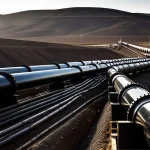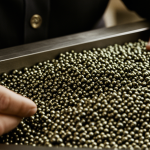Efficient oil and gas transfer depends on robust pipeline technologies that tackle industry challenges head-on. Innovations in corrosion-resistant materials and high-strength alloys are extending pipeline lifespan while improving safety. Meanwhile, smart sensors deliver real-time monitoring to prevent leaks and optimise pressure. Advances in coatings ensure flow stability, and engineering methods fine-tune energy use across complex terrains. Together, these technologies redefine pipeline efficiency, offering practical solutions that boost performance and reduce environmental impact.
Cutting-edge pipeline materials enhancing efficiency and safety
Advanced pipeline materials are revolutionizing the oil and gas industry by significantly extending the lifespan of pipelines while reducing the risk of failures. One of the foremost innovations is in corrosion-resistant oil pipes, which are specifically designed to withstand the aggressive chemical and environmental conditions encountered in harsh operating environments. These materials prevent degradation caused by moisture, chemicals, and other corrosive agents, thus ensuring safer and more reliable oil transport.
Additional reading : What Challenges Are UK Businesses Facing in the Modern Economy?
High-strength alloys and composites play an essential role in boosting the capacity and durability of pipelines. These materials offer enhanced mechanical properties such as increased tensile strength and improved resistance to wear and fatigue. This not only allows pipelines to operate at higher pressures and volumes but also reduces maintenance needs and unexpected downtimes.
The combination of corrosion-resistant oil pipes with cutting-edge high-strength alloys provides a holistic solution to many challenges faced by pipeline operators. These innovations mitigate the risk of leaks and ruptures, contributing to safer infrastructure and more efficient operations. If you’re interested in exploring the range of options available, you can learn about the various oil pipe solutions from Vallourec.
Also read : How Can UK Businesses Stay Resilient in Uncertain Economic Times?
In summary, the adoption of advanced pipeline materials, including corrosion-resistant and high-strength options, is a critical step toward achieving longevity and safety in modern oil pipeline networks.
Smart monitoring technologies for real-time pipeline management
Real-time pipeline monitoring relies heavily on smart sensors integrated throughout oil pipelines to continuously track parameters such as pressure, temperature, and flow rate. These sensors promptly detect leaks or irregularities, allowing for immediate intervention. By leveraging oil pipeline safety technologies, operators can significantly reduce the risk of failures and spills.
One of the key benefits of this approach is the ability to conduct remote diagnostics via real-time data analytics. Such systems analyze incoming data continuously, identifying patterns that suggest wear or the onset of faults before they escalate. This proactive insight enables timely maintenance actions that prevent costly downtime and minimize environmental harm.
Moreover, adopting smart monitoring technologies enhances the overall safety and sustainability of pipeline operations. Early detection of leaks and pressure anomalies avoids major incidents, protecting surrounding ecosystems. These innovations represent a crucial step toward more reliable and responsible oil pipeline management. To further understand how these advances are implemented, you can learn about the various oil pipe solutions from vallourec.
Innovative coatings and insulation for flow assurance
The role of advanced pipeline coatings in oil and gas transport is pivotal for maintaining flow assurance and asset integrity. These coatings are specifically engineered to combat corrosion and abrasion, two primary challenges pipelines face in harsh environments. Recent developments have introduced multi-layered coatings that offer enhanced resistance, significantly extending pipeline lifespan while reducing maintenance frequency.
In parallel, insulation technologies have seen remarkable improvements aimed at stabilizing temperature within oil pipes. Maintaining optimal temperature is crucial to prevent the formation of hydrates and wax deposits that can cause blockages. Modern insulation materials exhibit superior thermal resistance and low thermal conductivity, which reduce heat loss and improve transfer efficiency. This is particularly critical for deepwater and cold climate pipelines where temperature fluctuations are pronounced.
Together, these innovations form a comprehensive suite of flow assurance solutions. Employing both protective coatings and advanced insulation safeguards the pipeline system against physical and thermal stresses. Enhanced coatings minimize corrosion and abrasion damage, while insulation preserves temperature stability, directly addressing key factors that lead to hydrate formation and flow interruptions.
For operators seeking reliability and efficiency, adopting the latest in advanced pipeline coatings and insulation technologies is a strategic approach. These solutions not only protect infrastructure but also optimize flow assurance, ensuring steady and safe hydrocarbon transport. To delve deeper into the specifics of oil pipe materials and coatings, you can learn about the various oil pipe solutions from Vallourec.
Engineering methods optimising oil and gas transfer
Effective pipeline engineering methods are crucial to ensure safe, reliable, and efficient oil and gas transfer. These methods prioritize energy-efficient pipeline designs and hydraulic optimisation to enhance flow performance while reducing operational costs. The integration of advanced engineering techniques enables pipelines to handle high pressures and variable flow rates typical in hydrocarbon transport.
Hydraulic modelling plays a central role in pressure and flow control, allowing engineers to simulate and predict fluid behavior within the pipeline system. By using precise hydraulic models, it’s possible to optimize pump stations, valve placements, and pipe diameters to maintain steady flow and minimize pressure drops. This modelling directly improves pipeline efficiency and reduces energy consumption by avoiding overdesign or unnecessary pumping power.
Flexible pipeline routing is another essential engineering method, especially when navigating challenging terrains such as mountainous regions or underwater environments. These routes are designed with adaptability in mind, incorporating materials and construction approaches that accommodate bending and external stresses without compromising integrity. Flexible routing minimizes excavation and disturbance, ultimately contributing to more sustainable and cost-effective infrastructure.
Modern pipeline construction also incorporates specific energy-saving techniques. These include the use of advanced coatings to reduce friction, smart sensor integration for real-time monitoring, and materials engineered to withstand extreme conditions while preserving flow efficiency. Collectively, these innovations reduce the carbon footprint of pipeline operation and enhance long-term reliability.
Plans for pipeline projects frequently involve consulting detailed engineering solutions to address operational challenges. To deepen understanding, you can learn about the various oil pipe solutions from vallourec, a leader in providing innovative steel pipe technologies tailored for reliable oil and gas transport.
Industry trends and case studies in advanced pipeline technology
Industry trends in the pipeline industry increasingly emphasize innovations that enhance safety, durability, and efficiency. One significant trend is the adoption of advanced materials and smart monitoring technologies that allow real-time data collection and predictive maintenance. These technologies enable operators to detect potential failures early, reducing downtime and environmental risks.
Case studies reveal notable improvements in performance after implementing cutting-edge pipeline solutions. For example, recent projects using high-strength, corrosion-resistant alloys have demonstrated longer service life and lower maintenance costs. These real-world applications confirm tangible efficiency gains, such as reduced leak incidents and optimized flow rates. Operators report an increase in uptime and a decline in emergency repairs, highlighting the value of these innovations.
Expert commentary underscores the critical role of integrating advanced sensors and automated control systems in modern pipelines. Specialists note that these tools allow for better decision-making and enhanced operational control, ensuring safer and more reliable oil and gas transport. Furthermore, ongoing research aims to develop even more durable coatings and flexible pipeline materials to adapt to challenging environments.
To dive deeper, learn about the various oil pipe solutions from Vallourec, illustrating how industry-leading products contribute to this transformative trend. This continual evolution shapes the future of pipeline technology, supporting not only current demands but also preparing the infrastructure for emerging energy challenges.






